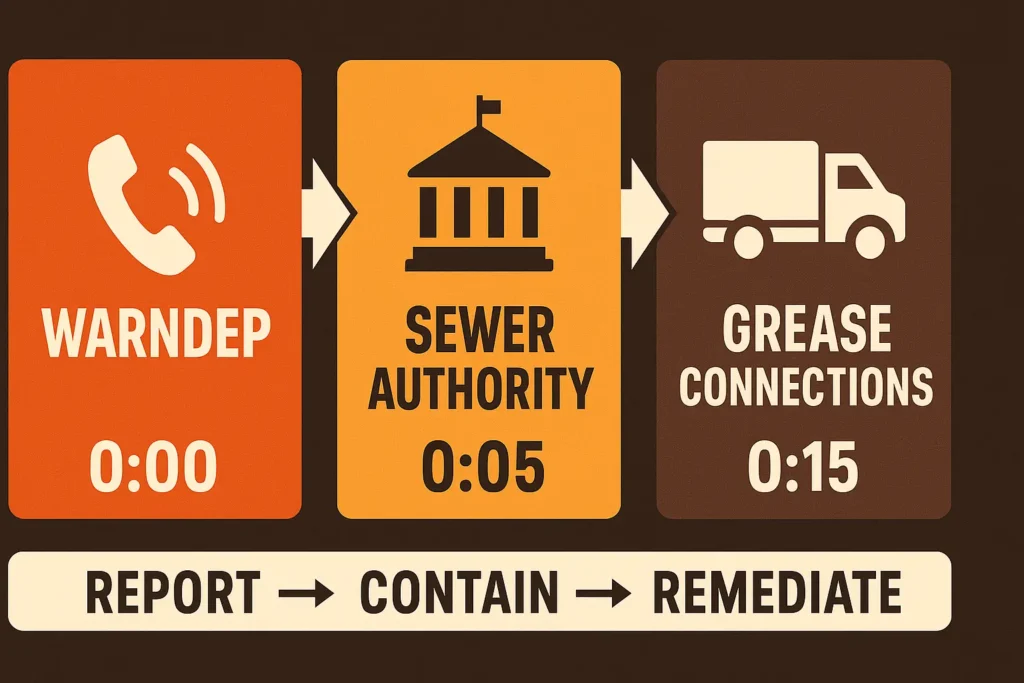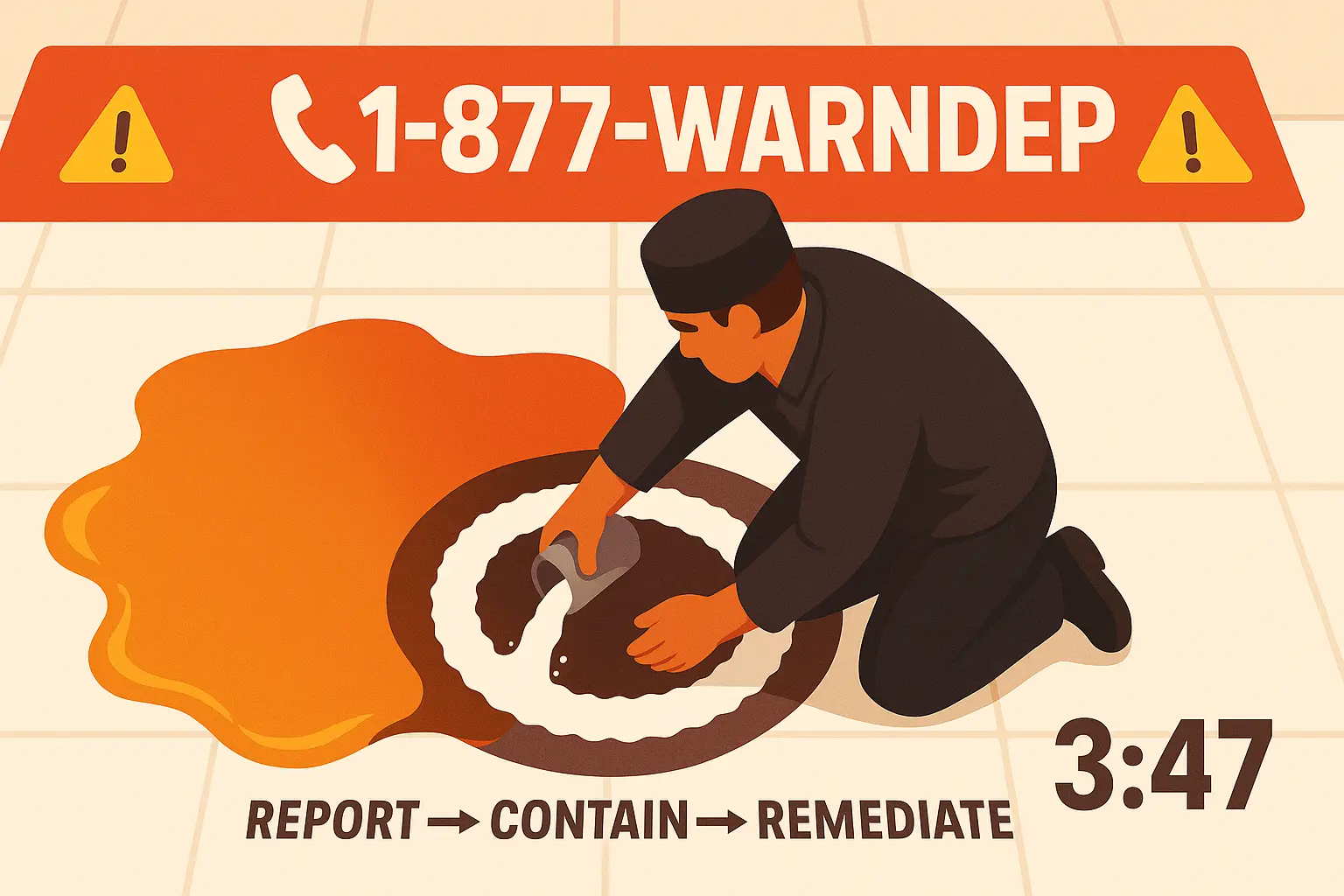Table of Contents
When Hot Grease Hits the Floor: Why Every Minute Counts
A gallon of 365 °F fryer oil coats 100 ft² in 30 seconds, turning your kitchen into a slip and burn zone and sending oil toward floor drains that feed New Jersey waterways. Under the Water Pollution Control Act, unreported discharges can cost up to $50 000 per day. Restaurants that act in the first five minutes cut cleanup bills by 70 % and rarely face shutdowns, according to 2025 county penalty data. Think of time as your cheapest absorbent.
Your First 5 Minute Containment Checklist
- Kill the heat on affected fryers to stop thermal flow.
- Deploy absorbent powder (corn based or mineral) in a doughnut ring around the spill to halt spread; modern powders soak 16× their weight.
- Shield floor drains with neoprene mats or rubber “pigs” so oil never reaches the trap.
- Alert the manager to initiate hotline calls (next section).
- Record the time; DEP asks for exact spill start when you report.
Who to Call First: NJDEP & Local Sewer Hotlines
New Jersey’s 24/7 environmental hotline, 1‑877‑WARNDEP, must be notified of any release that could reach water or soil. Spills in Hoboken, Union City, Weehawken, or West NY also require a call to the North Hudson Sewerage Authority at 866‑689‑3970. National Response Center (800‑424‑8802) is a federal backup for multi state events. Log ticket numbers; inspectors will ask.
Table 1 – Fast Dial Cheat Sheet
| Hotline | Purpose | Typical Response |
|---|---|---|
| 1‑877‑WARNDEP | State spill reporting | 15 min callback |
| 866‑689‑3970 | North Hudson sewer emergencies | Crew on site < 1 hr |
| 800‑424‑8802 | National Response Center | Federal relay |

Seal the Spill: Absorbents, Booms & Storm Drain Guards
Granular absorbents trap surface oil; hydrophobic pads float in sink basins; weighted drain covers stop flow into the interceptor. Keep at least 20 lbs of powder and two 3 ft sorbent socks within 25 ft of every fryer, mirroring Grease Connections safety guide. For outdoor mishaps, deploy a 6 inch polyurethane boom around storm drains most fines stem from parking lot overspray, not kitchen spills. Bag used media in DOT rated drums and arrange pickup by your used cooking oil collection company; mixing with trash is illegal under the Spill Act.
Kitchen Cleanup Without Injuries or Code Violations
Wait until oil cools below 150 °F before mopping to avoid steam burns. Use PH neutral degreaser caustics etch quarry tile and raise health code flags. Rinse with 140 °F water to keep fats liquid, then squeegee toward a capture mat, not a floor drain. Document cleanup with photos and logbook entries; many insurers rebate claim deductibles when records prove best practice.
Avoiding NJDEP Fines: Reporting & Documentation
NJ counties follow DEP’s 100 mg/L grease cap; daily penalties range from $210 in Salem to $1 140 in Essex. Bills such as S 3437 set minimum $2 500 first offense fines for unreported discharges. Submit Form AR 3 within 24 hours; fax or email counts as timely if hotline was called first. Keep spill logs three years; inspectors can fine $500/day merely for missing paperwork in towns like Maplewood.
Stop the Next Overflow: Grease Interceptor Rapid Checks
Overflowing interceptors cause 60 % of after hours spills, says 2025 Grease Connections compliance data. If the grease “cake” exceeds 25 % of tank depth or pump out is over 90 days old, schedule service immediately. Install a float alarm that buzzes at 80 % capacity; North Hudson approves the model GC 80 in its FOG program. Mark the pump out date in red on the kitchen calendar visual cues cut missed services by half.
Partnering With a Certified Emergency Cleanup Crew
A 24/7 spill response crew arrives with vacuum tankers, heated wash systems, and manifest paperwork, shaving four hours off reopening time. Verify that the team holds NJ hazardous substance carrier tags and can haul both used cooking oil and contaminated wash water; separate vendors double costs and delays. Grease Connections advises choosing one vendor for collection, interceptor service, and emergency cleanup to streamline compliance.
After the Spill: Insurance, Audits & Staff Training
Submit hotline ticket numbers and cleanup receipts to your insurer within 48 hours; many carriers waive deductible for proven best practice. During the next health inspection, show your spill kit checklist and training roster to avoid downgrade notes. Schedule quarterly “live drills” modeled on the five minute checklist kitchens that rehearse cut actual spill time from 11 min to 4 min, based on 2024 field data.
Table 2 – Absorbent Options at a Glance
| Material | Best Use | Disposal Note |
|---|---|---|
| Corn based powder | Smooth tile floors | Compostable if oil < 10 % |
| Mineral clay | Parking lots | Hazardous waste if saturated |
| Hydrophobic pads | Sink basins | Bag & drum |
| Poly drain cover | Storm grates | Rinse, reuse |
This page turns panic into a plan so your New Jersey restaurant stays safe, open, and fine free.









